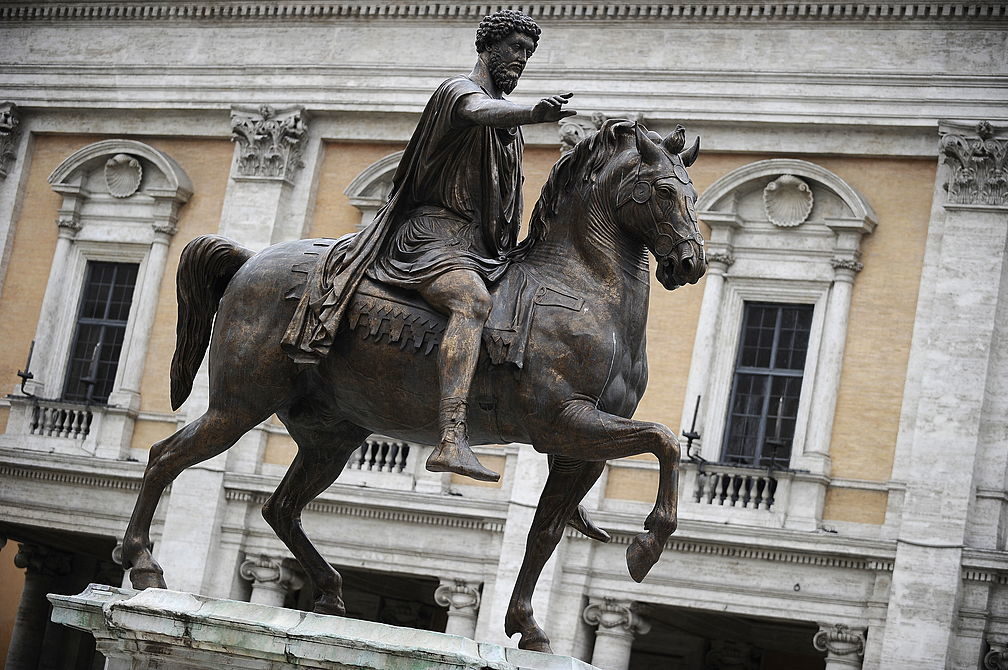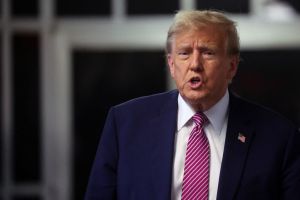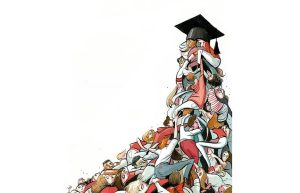In 2006, as British Euroskepticism was gathering steam, Boris Johnson published a book called The Dream of Rome, in which he held up the Roman Empire as a successful model of European integration and as a foil to the unlovable European Union. That was a rather peculiar choice. You would hardly have expected the future Brexiteer to yearn for a time when Britain was but a marginal province of a ‘European super-state’, a label that Margaret Thatcher had once applied to the EU, yet which is a much better fit for imperial Rome. But Johnson also failed to realize that it had actually been the end of Roman power that launched Europe’s long, tortuous and unique journey toward modernity — a journey in which the sovereign United Kingdom came to play such an outsized role.
To be sure, he was in good company: we have long been taken in by Edward Gibbon’s famous lament that the decline and fall of the Roman Empire was the ‘most awful scene in the history of mankind’. Back in what used to be called the Dark Ages that followed Rome’s unraveling in Western Europe, this might have made some sense, even if most people simply traded old burdens (say, Roman tax collectors) for new ones, such as greedy knights. It is only with the benefit of hindsight that we can tell what a huge difference the end of empire really made.
In other parts of the world, from the Sahel and the Middle East to India, China and the Andes, empires came and went: those that failed were soon replaced by others. State-building moved in grand cycles of growth and decline, of intensification and abatement of centralized power. In most of Europe, by contrast, large-scale empire never returned. That was not for want of trying: history is littered with abortive attempts, from Charlemagne to Napoleon.
Even as Europeans exported imperial rule to ever larger parts of the globe, it never took off back home. Russia, buffeted by threats from the Inner Asian steppe, remained the only exception. Farther west, the ramshackle kingdoms, unruly duchies and plucky city-states of the Middle Ages found themselves locked into never-ending conflicts, coalitions and compromises that gradually and very painfully forged them into modern nation states. An inordinate amount of blood was spilled in the process, both in Europe itself (all the way up to 1945) and almost everywhere else in the world, as the twin scourges of colonialism and slavery scarred entire continents. Yet in the end, it fell to Europe’s cluster of competing states to usher in modernity.
This was not a coincidence. Historians, economists and political scientists have been laboring hard to account for what they like to call the Great Divergence — the process whereby European (or Western) societies ever more forcefully pulled ahead of the rest of the world in terms of economic productivity, technological innovation, longevity, health, education, and inclusive political development. Broadly speaking, explanations come in three flavors.
One school of thought emphasizes the contribution of institutions thought to have fostered modernizing change: feudalism, the influence of the church, the diffusion of social power among autonomous urban communes and corporate bodies such as guilds and universities, the constraints early versions of parliaments imposed on rulers, and financial innovations such as public debt. Another perspective focuses on the gains of colonial rapacity: ruthless exploitation turned much of the world into a subordinate periphery whose resources, markets and forced labor helped sustain Europe’s economic growth. A third strand of research homes in on technological and scientific breakthroughs — and rightly so. After all, industrialization would have been impossible without sophisticated engineering and novel sources of energy, and longer and healthier lives depended on a deeper understanding of micro-fauna that was invisible to the naked eye. Freed from the monopoly power of a unified church or a single imperial overlord, European scholars, craftsmen and tinkerers built up a culture of knowledge that prioritized experimentation and practical utility. Entrepreneurs and capitalists, whose prestige had risen as the bourgeoisie gained ground at the expense of more conservative traditional elites, stood ready to apply and profit from this expansion of useful knowledge.
Each of these competing and complementary visions of historical change captures some significant portion of what distinguished Europe from other parts of the world. Better still, there is no need to choose one over another, for they all share a single root: the intense fragmentation of power after the fall of Rome. Imperial collapse opened up space for many smaller successor states. In each of them, rival constituencies, from kings and nobles to popes, bishops and abbots, and from knightly warriors to urban merchants, vied for influence and status. These multiple fractures both between and within states ensured relentless competition that did not merely cause a lot of suffering but also fostered innovation and routines of bargaining and compromise. Over time, this deeply entrenched pluralism gave rise to an entirely new eco-system of checks and balances, of protected spaces for open inquiry and commerce, which flourished as long as no single source of power swept all before it.
Nowhere else in the world, where empires continued to rise and fall, could such complex arrangements take hold and survive over the long run. Intermittent power monopolies stifled human development. As long as empires thrived, they brought peace and stability but also encouraged conservatism, predatory rule and stagnation. And whenever they fell apart, as they invariably did, the deck got reshuffled.
Had the Roman Empire survived — or, more plausibly, had some version of it come back the way successive Chinese dynasties kept re-uniting much of East Asia — business as usual would most likely have been the order of the day: no brash commercial elites, no formal bargaining between rulers and civil society, no overturning of hallowed doctrine, no urge to go and explore (and exploit) the world, no need to outcompete one’s peers. There was nothing that made Europe or the West special as such: whatever degree of exceptionalism we wish to ascribe to them had slowly grown out of 1,500 years of freedom from empire.
Does this kind of fragmentation still deliver similar benefits today? It came at a steep price, and international agreements of the post-war era owed much to the desire to prevent old horrors from staging a comeback. Cooperation has replaced outright domination: exiting the European Union is not quite the same as breaking free from an evil empire. The fruits of modernity have been disseminated around the globe: societies no longer need to be ‘Western’ in order to benefit from them and harness them for their own purposes. Managing the growing environmental fallout from one of Europe’s biggest breakthroughs — the transition to a fossil fuel economy — urgently calls for coordination on a global scale. None of this speaks in favor of old-style nationalism.
Empire did have to go away for good. There was no hope of ‘getting to Denmark’ — of building societies that enjoy freedom, prosperity and general welfare — without ‘escaping from Rome’ first. Competitive pluralism was essential in putting humanity on a novel trajectory toward previously unimaginable riches, knowledge and well-being. Then again, it is possible to end up with too much of a good thing. Will the enduring legacies of productive disunity block worldwide cooperation when we need it most?



















